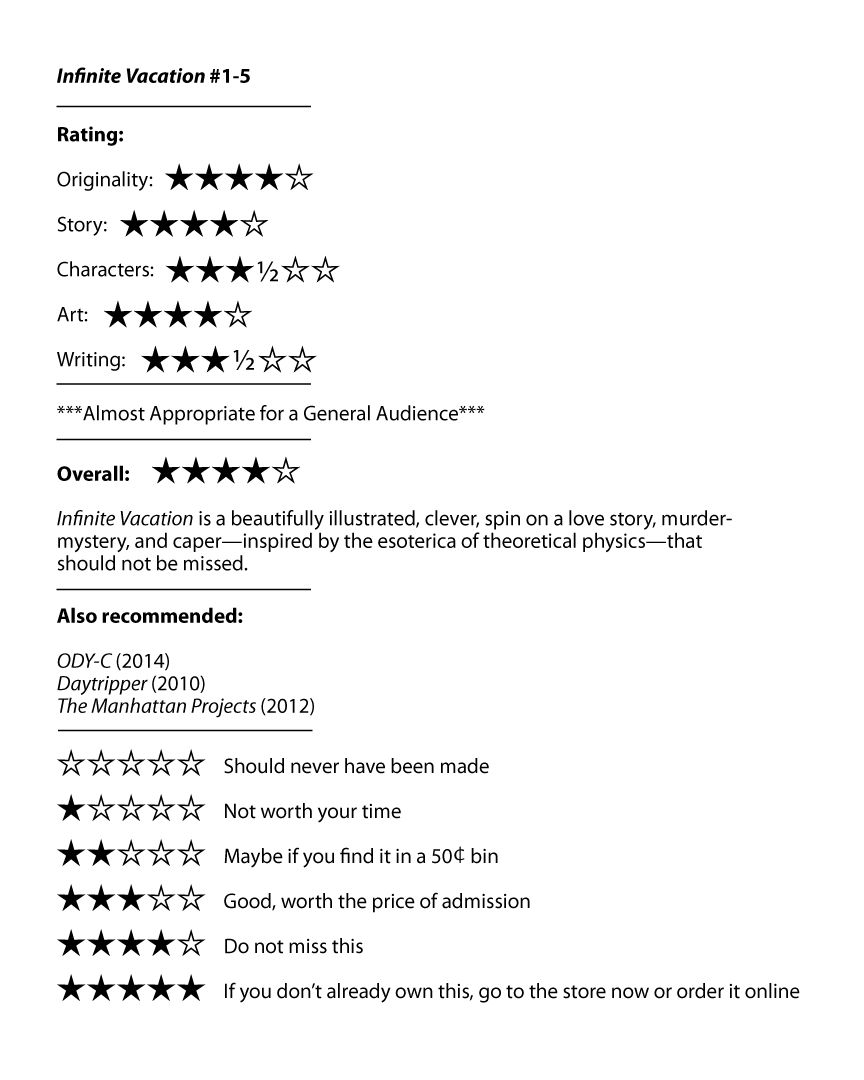Infinite Vacation #1-5
Published by: Image – 2013
Written by: Nick Spencer
Illustrated by: Christian Ward
Infinite Vacation is clever. Example: If there are an infinite number of universes encompassing every possibility, then there must be one universe where there are no other universes. That inspired notion is one of several that run through an otherwise straightforward caper about singular love and infinite murders.
Infinite Vacation isn’t just a snappy name for a comic, but, within that comic, also denotes the eponymous, large, multi-universal corporation that allows individuals to sell vacations within their realities to other incarnations of themselves from parallel realities. So, for example, you could pay to temporarily trade places with a version of yourself that is rich, famous, and married to a lingerie model. Or, more mundanely, if you miss a bus, you can pay a small fee to transfer to a universe where you didn’t miss the bus. The options are all there for you to choose, your only limit being the size of your wallet.
The action is propelled by two things: first, a series of murders targeting one particular user of the Infinite Vacation service and, second, the woman he’s fallen for—a “deadender” named Claire. Deadenders, also known as “singularists,” are a quasi-religious group composed of people whom refuse to participate in the reality-sharing program for one reason or another.
The art is beautiful. Christian Ward knocks it out of the park on this one. The computer-colors, painted textures, geometric motifs, symbolism, and pattern-like repetitions create beautiful compositions that are interesting to look at—dare I say entertaining—even when divorced from their narrative content. The only real artistic shortcoming is the use of scenes featuring photography in place of the usual illustration. These scenes are separate from the primary narrative, serving an expository purpose, and, thus, are appropriate for a change in style, but, for some reason, unmanipulated photography rarely works well in comics—especially if juxtaposed with highly stylized art that borders on the psychedelic.
The writer, Nick Spencer, somehow makes this comic more about the humans involved in the adventure than about the ideas which undergird that adventure. With a premise that inspires thoughts that straddle the line between theory and philosophy, it would be understandable if the characters were not center stage, but the high-stakes mystery, ensuing caper, and odd little love story are what one is left remembering when they finish the last page of the last issue, with a little wistfulness, a little melancholy, and a little sentimentality.
Infinite Vacation is almost suitable for a general audience. Almost. There are references to a cannibal universe, and some gruesome mutilations and murders, which are dealt with skillfully enough that they are taken at face-value then passed over, rather than milked for stomach-turning sensationalism.
Recommendations:
If you like Ward’s art, the obvious recommendation is his other Image Comics series ODY-C written by the usually reliable Matt Fraction. It is, at least in part, a retelling of Homer’s Odyssey where all the characters are female. Ward’s art in ODY-C is inventive, complex, eye-catching, and amazingly colorful. Unlike Infinite Vacation, ODY-C is an “adults only” comic, featuring plenty of blood, sex, nudity, and violence. Ward has also, as of late, done some work for Marvel, including Ultimates’ Black Panther and Black Bolt.
If you like Spencer’s writing, the obvious recommendation is to look into other comics he’s had a hand in—such as Morning Glories published by Image, or one of the several superhero titles he’s done at Marvel. I, however, cannot vouch for any since I have yet to read any.
Fans of Infinite Vacation as a whole would likely also appreciate Daytripper by brothers Gabrial Ba and Fabio Moon or The Manhattan Projects by Jonathan Hickman (writer) and Nick Pitarra (artist). Daytripper is a poignant tale of the many deaths of a single man—a retelling of his life at all the moments he could’ve died. It is as if it is a tale of separate incarnations of a single man spread across parallel universes, but this is never codified as such; it is simply allowed to be what it is, a series of possible deaths with none being canonical over the others.
Manhattan Projects on the other hand is a surreal reimagining of the researchers involved in developing the first nuclear weapons; these scientists though, within the story, are involved in far stranger things—aliens, interdimensional travel, etc.—and no one is whom they appear.
Brian Bigelow
August 25, 2018
